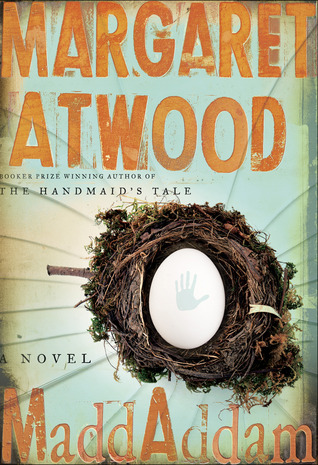A man-made plague has swept the earth, but a small group survives, along with the green-eyed Crakers – a gentle species bio-engineered to replace humans. Toby, onetime member of the Gods Gardeners and expert in mushrooms and bees, is still in love with street-smart Zeb, who has an interesting past. The Crakers’ reluctant prophet, Snowman-the-Jimmy, is hallucinating; Amanda is in shock from a Painballer attack; and Ivory Bill yearns for the provocative Swift Fox, who is flirting with Zeb. Meanwhile, giant Pigoons and malevolent Painballers threaten to attack.
The conclusion to Atwood’s MaddAddam trilogy was actually, on the whole, more optimistic than I might have expected, given that the entire tale takes place after the expunging of most of humanity in a world that was already pretty desecrated. I’d even venture to say that there is a complete tonal shift over the course of the three: Oryx and Crake is, based on my memory, a somewhat bleak book. Jimmy, the protagonist, is stranded and alone after the “waterless flood,” unsure of how to survive after Crake’s engineered bioweapon obliterates humanity. Injured and filled with impotent rage, Jimmy condemns Crake for what he has done, and in particular, how he claimed ownership of Oryx’s life and death. Through Jimmy, the reader feels similar despair and anxiety over the new state of the world. The Year of the Flood is slightly more hopeful: it introduces new characters, which in the first place establishes that there are survivors other than Jimmy. They are a group of people known as God’s Gardeners, who portended the waterless flood and were therefore able to cultivate a sustainable lifestyle meant to last even after the collapse of the technology-based modern society. This organization and success in the face of certain chaos has interesting implications for the modern reader, though. On its face, the message is hopeful — humans have survived against all odds. The counterpoint, however, is that the people who do survive are, essentially, a radical religious eco-cult — hippie extremists — and they survive because they have eschewed anything that isn’t completely natural. The waterless flood, then, killed the majority of humans because they — we — embrace technology, particularly biotechnology. So while the conceit of dogged human survival that we so love imbues The Year of the Flood with hope, it still has an anti-biotech bent, a warning for our future.
MaddAddam continues the shift toward optimism in two ways. First, it has the surviving humans working together in (mostly) harmony. The group consists of some of the God’s Gardeners and some scientists who, though unaware of Crake’s complete plan, worked closely with him in creating some of the technology that eventually led to the waterless flood. Secondly, it introduces us more intimately to the Crakers, the genetically engineered humans created by Crake, who were intended to be the more perfect human descendants that would inherit the new world. The humans could, conceivably, have any number of reactions – resentment among them – to these child-like, defenseless people, but instead they basically fall right in line with Crake’s intended mission, which is to orient the Crakers to the world enough to allow them to navigate it, without corrupting them too much by introducing our own negative traits. The measured conversations between the human characters — primarily Toby — and the Crakers, who have a very rudimentary grasp of language and a disarming naïveté, resulted in a great deal of out-and-out humor that was not so much present in MaddAddam‘s predecessors. For instance, a running gag begins when the Crackers ask what is meant by the humans’ frequent exclamations of “Oh f*ck!” The confusion arises because the Crackers see “Oh” as a term of address, so they think that the humans are talking to someone unseen named “F*ck”. Toby, desperate to not explain the unpleasant interpretations of the word, invents a spirit that is friends with Crake (who the Crakers understandably see as a deity) and rushes to the aid of whoever uses the invocation “Oh F*ck!”
The laugh-out-loud humor itself considerably lightens the mood of the book, but what really works to change the tone is the acceptance of the Crakers. For all of the biting satire that criticized our over-reliance on technology and liberal incorporation of genetic engineering into our lives, the human characters’ deference to Crake’s wishes with regard to the education of the Crakers suggests that, maybe, Crake was right about these genetically engineered humans being the way of the future. Where the prior two books seemed to be thematically about humans struggling against the new world, this one markedly demonstrates the humans working with Crake’s vision.
Still, this isn’t an entirely happy book. There is anxiety, PTSD, sickness and death, much of it gut-wrenching and heartbreaking. Atwood balances these elements to create a conclusion to the story that is, as I said, hopeful, but also real and not saccharine. MaddAddam was probably my favorite book of the trilogy and the best example I can think of recently of a series that ended appropriately, without seeming rushed, and with an installment that was worthy of its predecessors.



